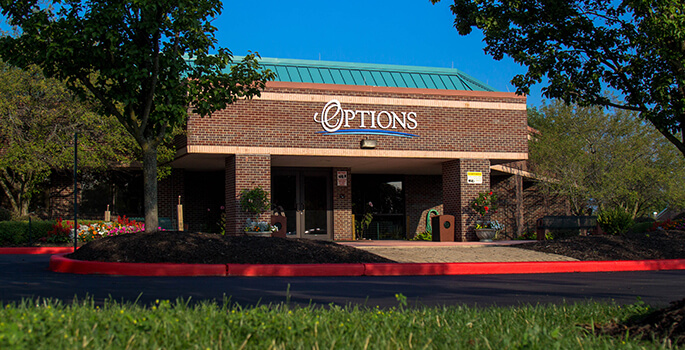Understanding the signs, symptoms, causes and effects of Alzheimer’s disease is an important first step toward healing and recovery.
Understanding Alzheimer's Disease
Learn about Alzheimer’s disease
Alzheimer’s disease is the most common type of dementia. Dementia is a collection of symptoms and disorders that involve loss of memory and other thinking and intellectual abilities. Dementia is not a specific disorder, but refers to symptoms caused by a number of underlying diseases. Alzheimer’s disease accounts for 60%-80% of all cases of dementia. Alzheimer’s disease is a progressive illness caused by damage to the brain that leads to the death of brain cells. The progressive loss of brain cells results in memory loss, changes in thinking, personality alterations, and behavioral problems, among other difficulties. Alzheimer’s disease usually develops over time and gradually worsens. As the disease progresses, increased support will be required for the people with Alzheimer’s. In the late stages, help with all daily activities will be necessary.
While some common symptoms of Alzheimer’s disease exist, it is important to understand that everyone experiences the illness in different ways. While no cure for Alzheimer’s currently exists, medications have been developed that can temporarily relieve some of the symptoms or slow the progression of memory loss in many people. Some medications can stabilize an individual’s symptoms for a year or longer.
The earlier the disease is identified and treated, the greater the likelihood that medications can help delay the most progressive symptoms and allow you to live a happy life surrounded by those you love. Treatment and therapies for Alzheimer’s disease are helpful for you and your loved ones to assist one another in coping with the emotions surrounding an Alzheimer’s diagnosis, as well as coming to terms with the disease.
Statistics
Alzheimer’s disease statistics
It’s been estimated that 1 in 3 seniors in the U.S. dies from Alzheimer’s disease or another form of dementia. Alzheimer’s disease is the sixth leading cause of death. This accounts for approximately 5.2 million Americans of all ages. Included in this estimate are about 5 million people over the age of 64, representing 11% of the population, and approximately 200,000 people 64 years old or younger who are diagnosed with early-onset Alzheimer’s. It’s been estimated that 32% of those over the age of 84 suffer from Alzheimer’s disease, compared with approximately 4% age 64 and younger, 13% within the age range of 65 and 74, 44% between the ages of 75 and 84, and 38% above the age of 84.
Causes and Risk Factors
Causes and risk factors for Alzheimer’s disease
The precise cause for the development of Alzheimer’s disease is not well understood. The characteristic brain changes that are the hallmark of Alzheimer’s cannot be seen through imaging techniques and are only identifiable upon physical examination of the brain. Some causes for the brain abnormalities identified in Alzheimer’s disease include:
Genetic: Less than 5% of the time, Alzheimer’s disease is caused by genetic changes that virtually assure that an individual will develop Alzheimer’s disease.
Brain Structure and Function: Plaques are extremely small microscopic clusters of a protein called beta-amyloid peptide. Tangles are tiny entwined threads of the tau protein. Connections between brain cells control memory, learning, and communication. These connections between neurons in the brain convey information from cell to cell. Swelling in the brain results from the exertion expended in fighting off the fatal effects of the other changes occurring in the brain. Ultimately, death of brain cells and severe shrinking of the membrane within the brain lead to the symptoms observed in Alzheimer’s disease.
Physical: Individuals who develop Alzheimer’s disease are almost universally over the age of 65. Women, who outlive most men, are more likely to develop Alzheimer’s disease. In addition, individuals who have a mild cognitive impairment or past head trauma are at greater risk for developing the disease.
Environmental: Individuals who have spent their lives engaging in mentally and socially stimulating activities have been noted to have a reduced risk for the development of Alzheimer’s disease.
Signs and Symptoms
Signs and symptoms of Alzheimer’s disease
The symptoms of Alzheimer’s eventually encompass every area of the individual’s functioning. While these symptoms will vary among individuals, Alzheimer’s disease does tend to follow a particular progression. The most common symptoms of Alzheimer’s disease include:
Mood Symptoms
- Alterations in mood, mood swings, inconsistent or inappropriate emotional responses
- Personality changes
- Confusion
- Disorientation
- Inability to orient to person, place, and time
- Frustration over inability to communicate or remember things
- Apathy
Behavioral Symptoms
- Decrease in the ability to read familiar writing
- Withdrawal from occupational or social situations
- Misplacing common items
- Getting lost
- Difficulty driving until it becomes hazardous
- Inability to produce the correct words to describe objects
- Inability to participate in a conversation
- Significant decrease in verbal fluency
- In later states, non-fluency
- Poor comprehension
- Inability to remember and repeat a statement immediately after it was made
- In final stages, the individual may become practically mute
- Violence
Physical Symptoms
- Inability to understand visual-spatial concepts
- Inability to perform motor activities, despite motor abilities and the ability to understand what is necessary to carry out the task remaining intact
- Impaired gait
- Increased falls
- Impaired safety awareness
- Inability to properly navigate environment
- “Pocketing” food in the sides of mouth
- Choking
- Inability to swallow
- Inability to perform activities of daily living
Psychological Symptoms
- Memory loss
- Inability to recognize or identify personal, familiar, or common objects
- Inability to speak coherently or understand language
- Inability to think abstractly, plan simple tasks, or carry out complex tasks with repeated step-by-step instructions
- Impaired judgment
- Unable to make sense of visual images
- Inability to retrace steps to locate something misplaced
- Overall behavioral problems
- Behavioral regression
- Angry outbursts, aggression, or violence
- Wandering off
- Perceptual disturbances, including delusions
- Distrust of others
- Lack of inhibitions
Effects
Effects of Alzheimer’s disease
Alzheimer’s disease is not a curable condition and progressively worsens over time. The long-term effects of Alzheimer’s disease can be devastating to both loved ones and the individual. Some of the long-term effects of Alzheimer’s disease include:
- Suicidal thoughts and behaviors
- Inability to communicate pain
- Inability to communicate symptoms of illnesses
- Difficulty swallowing
- Self-injurious behavior
- Increased vulnerability to developing pneumonia and other infections
- Injuries due to falling
- Poor balance
- Difficulty controlling bowel and bladder functioning
- A sense of loss of self
Co-Occurring Disorders
Alzheimer’s disease and co-occurring disorders
There are a number medical and psychological disorders that co-occur with Alzheimer’s disease. These include:
- Vascular disease
- Thyroid disorders
- Sleep apnea
- Osteoporosis
- Glaucoma
- Depression
- Anxiety
- Cardiovascular disease
- Diabetes
- Musculoskeletal
- Genitourinary disorders
- Intermittent explosive disorder
- Psychosis











